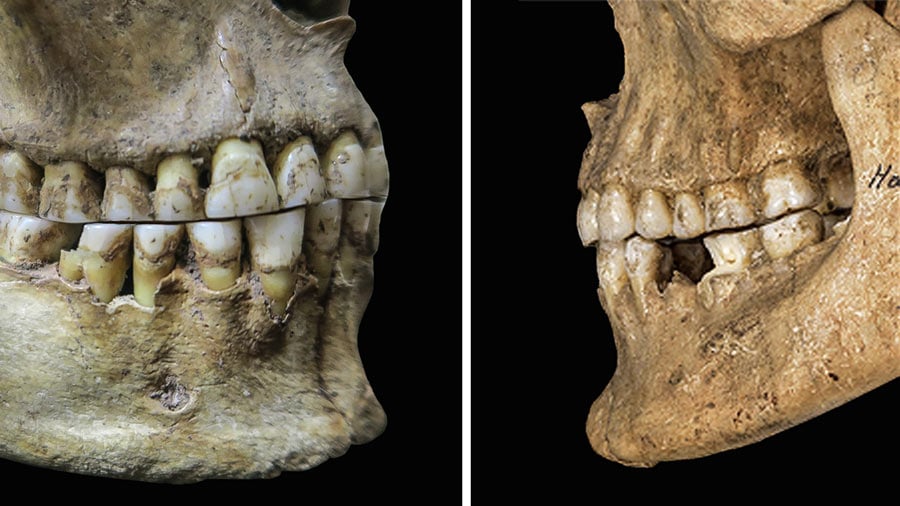
At the dawn of the Neolithic revolution, which occurred around 10,000 years ago, humans began eating less raw wild foods and more processed meals. A study published in Science shows how this reduction of pressure on the teeth caused changes in the way the human jaw developed and grew. Adults of the new agricultural world developed an overbite that caused the top teeth to grab the bottom lip, and so were born the “f” and “v” sounds we use so often today.

The switch from wild, raw foods to more processed meals, changed the human overbite. Image shows paleo diet products. (Mara Zemgaliete / Adobe Stock)
Charting the Change of Ancient Voices
The study was conducted by a team of scientists at the University of Zurich. They showed how a new range of new, preferred consonants, called “labiodentals”, emerged in the Neolithic period. These sounds, it was discovered, sparked the diversification of languages found across in Europe and Asia today.
The study was inspired after the work of the great American linguist, Charles Hockett, who in 1985 suggested the languages spoken by tribes of hunter-gatherers lacked labiodentals. He believed that when hunters dieted on tough, high fiber foods, a greater force was impressed on the upper jaw bone causing molars to wear down rapidly. With flattened upper molars, the lower molars grew larger and drifted forward on the protruding lower jaw causing the upper and lower teeth to align.
This “edge-to-edge bite,” said Hockett, made it harder for the upper teeth to latch over the lower lip, which is required to pronounce labiodentals like “f” and “v”. At the time most linguists shunned Hockett’s idea for lack of supporting scientific evidence. Thus, when Postdocs Damián Blasi and Steven Moran worked in Bickel’s lab analyzing Hockett’s controversial ideas, the team “expected to prove Hockett wrong,” but the opposite was the case.

The development of agriculture changed human diet, and in so doing produced the human overbite which created a wider range of sounds. (Heritage of Japan)
New Sounds Spread Like Wildfire
To begin with, the team of six researchers first worked out just how much an overbite affects the pronunciation of labiodentals. A computer model revealed that an overbite makes “producing labiodentals takes 29% less effort than with an edge-to-edge bite.” This first result suggested Hockett might have been right, but much more work was required to prove this so.
The next step in the experiment was to analyze different indigenous languages around the world. It was found that hunter-gatherer languages “have only about one-fourth as many labiodentals as languages from farming societies.” This finding again affirmed Hockett’s 1980s hypothesis. However, it was when the team found that new labiodentals “spread quickly,” they realized new sounds go from being localized to widespread in around 8,000 years. This matches the time period when softer processed grain-based foods began replacing wild foods.

Biomechanical model of producing an f sound with an overbite/overjet (left) vs an edge-to-edge bite which was prevalent before the Neolithic (right). (D. E. Blasi et. al. / Science)
Small Changes Have Massive Effects
Those of you who have been unfortunate enough to have had any more that three teeth extracted at the one time will know that your entire voice changes post-op. While you slur and make uncontrolled “sh” sounds, the change in your mouth shape also disables certain other sounds. Similarly, Bickel noted that as diets changed and more adults developed overbites, people accidentally began to make the “f” and “v” sounds more often. These newly developed Neolithic consonants were found in “76% of Indo-European languages,” according to the new study.
In an article in ScienceNoreen Von Cramon-Taubadel, an evolutionary morphologist at the University at Buffalo who was not involved with the research, concluded that the study demonstrates that a cultural shift, in this case dietary, “can change our biology in such a way that it affects our language.” The project also found support from linguist Nicholas Evans, of Australian National University in Canberra, who said the team’s multi-method approach meant the results were “convincing.”
We Pay For New Sounds With Pain
In conclusion, the findings of the study not only confirm the suspicions of American linguist Charles Hockett, in that diet directly affected the development of speech and language, but they also show that our ability to form “f” and “v” sounds might have “come at a cost.” With the new overbite caused by chewing softer foods our lower jaws became shorter, impacting the healthy development of our wisdom teeth. This is a great part of the reason so many of us today suffer molar crowding and the resultant cavities, demonstrates the study.